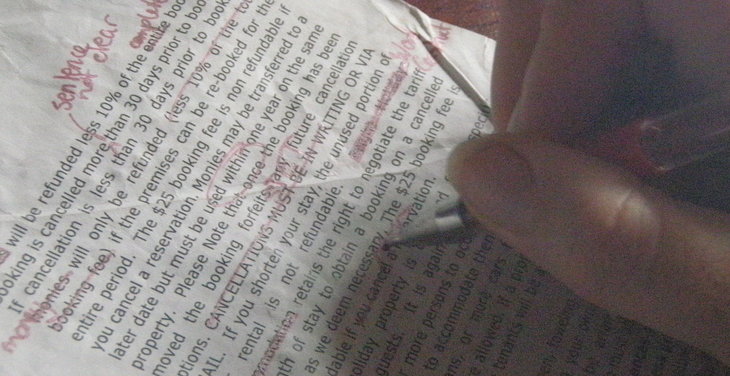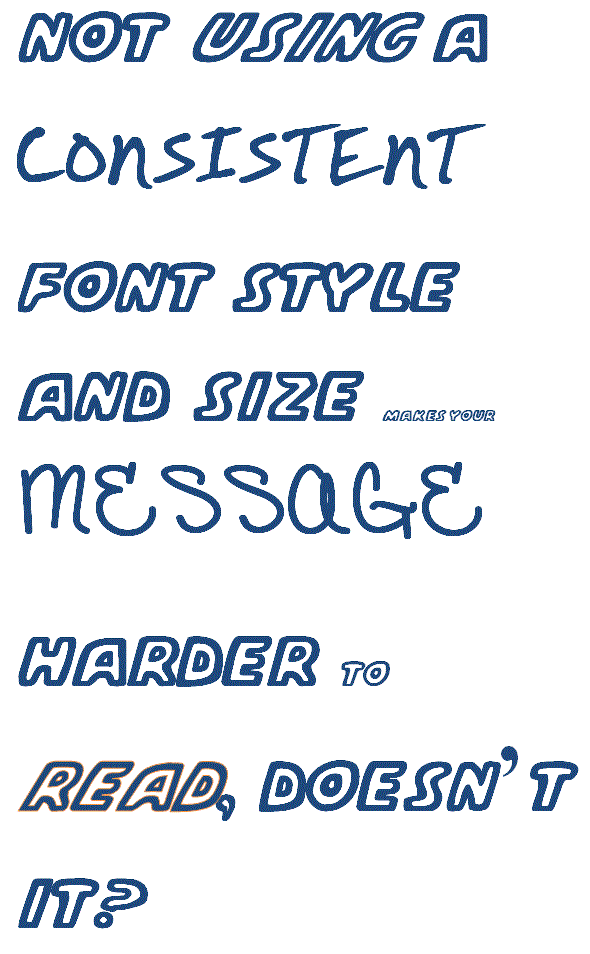TashWord
Tash is a professional writer who loves helping people communicate clearly and effectively.
 Ok, proofreading is boring – not many people actually enjoy the thought of reading their work over and over again to find errors. It’s a bit better proofreading someone else’s work, but most people still don’t want to do it.
Ok, proofreading is boring – not many people actually enjoy the thought of reading their work over and over again to find errors. It’s a bit better proofreading someone else’s work, but most people still don’t want to do it.
However, like many things in business and in life, it is necessary.
Necessary that is if you want a professional finish to your written materials.
So here are my tips to make it as easy and painless as possible:
Some tips will suit you more than others, some will be more appropriate for particular documents, too. However, using a range of techniques (especially for more important documents) will help you achieve a higher quality document.
This is a pair of words that sound identical and have the same letters but have very different meanings and are very different in other tenses.
pride: feelings of self-respect, value, and worth, especially after an achievement or about a particular aspect of self/life
Mary takes pride in her work and her customer’s feedback.
He has pride; she is proud
pried: to have peered or looked into something beyond a casual glance; to have levered things apart
Tom pried the board off the fence so he could see inside.
She pried into his papers; a spy will pry into many things.
Last week I referredto a post by Danielle Keister about admitting she is human and may make mistakes before she actually makes any. The other detail I got from her post was her insistence on having a consultation or meeting at the beginning of each client relationship.
I think a consultation is a valuble step in an ongoing business relationship but it doesn’t matter as much when you are dong a small one-off task for the client. Given you are trying to make relationships with clients, here are some reasons to value consultations:
However, it isn’t always practical to meet face to face with clients. Personally, I have had a small proportion of my clients in Melbourne with the rest being interstate or overseas. I have travelled interstate and to New Zealand to meet ith clients but it generally isn’t feasible.
So here are some other ways to build client relationships in the early stages:
How do you establish good relationships with clients from the begining? Do you insist on some sort of start up meeting?
artisan: a skilled craftsperson or manual worker
A number of artisans can be seen at work behind their market stalls.
artist:a person skilled in a fine art (such as painting, silversmithing or sculpting)
Johann asked the artist to do a portrait of his wife.
artiste: a professional performer or enteratiner, especially a dancer or singer; someone with artisitic pretensions
Dame Nelly Melba was an artiste renowned for her farewells.
So an artisan is skilled a manual skill outside of the fine arts, which could include a mechanic, a carpenter, a cook and a draftsperson. Some artisans may be artistic even if they don’t work with a fine art.
“I visited your blog. Recipricate the visit {URL}”
“CD wants you to read the blog post {URL}”
Believe it or not, these rude requests have recently entered my blog comment and email box. Do they really think it will result in me clicking on their link? I certainly didn’t, and I deleted their comment/email as well.
It really annoys me when people are rude, but more so when people expect me to react because they have chosen to do something.
So what if you have read my blog post? That doesn’t mean I automatically have an interest in what you blog about, yet a number of people have this expectation; even worse are those associates/friends who expect me to read their blog regularly just because I know them, even if there is no sign they have EVER read any of my blog posts!
It’s like those people (not clients) who get annoyed because I don’t return their phone call straight away – it may suit them to call during the day but I have a business to run!
Not a very constructive blog post I admit, but there is some relief to vent about rudeness and expectations! Of course, we can all take the message that a polite request is much more likely to get someone to do what you want (in this case, read your blog post!)
While this may be an uncommon pair of words in business writing, they are both used in speech fairly often so it is worth knowing how to spell both words.
fogy: person with old fashioned ideas and attitudes. Also spelt fogey and often used in a derogative way.
Jim was only 20 but his friends called him an old fogy.
foggy: murky, not clear, dull. Often refers to air when clouds are low
It was foggy when we climber out of our tents this morning.
Consistency is an important aspect of building your brand. It is easy to remember to always use the same colours, fonts and logos, but you also need consistency in the details you provide.
For instance, I recently received an email where the sender’s email address was different to the one in the signature (and I mean completely different – names and domains varied!) and both were different to the URL of the business! I didn’t try any of them and deleted the email…
Contact details are not only important for branding and consistency, they are also crucial in building trust. A business that uses a different email address to what they advertise or refuses to give any contact details on a website and so on can give the impression of hiding something – not a great way to establish trust.
Personally, I also notice when people use an email address that doesn’t match their URL. For one thing, why lose the promotional advantage of using your own domain name? And why promote someone else’s business instead? Using a different domain to your own also looks unprofessional – especially if it is a hotmail address.
What do you think of a business that doesn’t have contact details consistent with your domain? Does it impact on your sense of trust?
How do you deal with making mistakes? Do you accept that you are going to make mistakes when dealing with clients, and consider how to deal with the aftermath?
I came across a blog post by Danielle Keister where she advises new VAs that they will make mistakes. I love her attitude and her honesty in warning people that they will make mistakes – “Someone who says they never make mistakes is a liar (or delusional).”
What really caught my eye, though, is her ‘speech’ to prospective clients. She basically tells them that mistakes may occur despite her best intentions but that she will also work at fixing them as soon as she is aware of them. Her ideal business relationship is built on trust – people trust her to do the job and fix mistakes and she trusts them to be honest and give her feedback.
I have never written out my attitude about mistakes like Danielle, but I think what she has written is close to what I would write for myself. As a writer, I often deal with feedback from clients and fully expect that to occur – together, clients and I get the best result for their needs as I have the communications skills and they know their brand, business and customers best. This is why my quotes often include a certain number of edits.
Of course, that feedback is not often based on me making a mistake but on technicalities in content, personal preferences and unclear objectives. When it is my mistake, though, I apologise and do my best to quickly rectify the situation. I do that naturally out of a sense of pride and professional integrity.
Additionally, I know that I prefer a supplier to be honest and admit their mistakes to me – I am less likely to return somewhere that makes mistakes but denies or hide them. So it is a business decision to deal with mistakes openly, too.
Given that we are all human and make mistakes, do you have a policy or guideline for dealing with mistakes once you are aware of them?
Have you ever come across a website that is obviously out dated? What do you think of it when you do?
I recently came across two extreme examples of this…
Those sites didn’t impress me at all!
While adding content regularly is good practice for a website, there are also some ways to avoid your content being obviously old:
Recent Comments